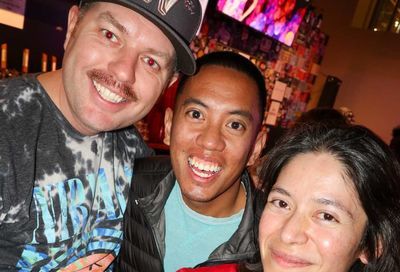Fur Flurry
Studio's Venus in Fur is an exceptionally sharp theatrical exercise in the hands of David Ives and David Muse
Ah, the tyranny of the audition room. If you’ve never been privy to the emotionally grueling ritual to which actors – if they’re lucky enough to make it that far – submit themselves time and time again, Studio Theatre’s wickedly witty production of Venus in Fur provides a most revealing glimpse of the games that theater people play.

Conn and Sullivan
(Photo by Scott Suchman)
A glamorous environment, it’s not – especially as rendered in Blythe Quinlan’s evocative set: a threadbare torture chamber of a New York rehearsal room, illuminated by headache-inducing fluorescent tubes, where the grimiest of coffeemakers provides the only taste of comfort to the occupants.
The slightest hint of a director’s encouragement – an affirming nod, a muttered ”Go on” when the suppliants before him have reached the designated stopping point in their script readings – might be the only thing that keeps a desperate actor from gouging his eyes out with a salad fork once he rushes to his restaurant job.
He won’t have gotten the gig, of course. But if he’s been dismissed with a curt ”Next!” – not even a dozen words into the audition. Well, cry if you must, thespian, but there are dozens more just like you lined up outside, eager for their chance to be shot down, too.
This is the milieu in which we meet Thomas (Christian Conn), a playwright-director who is casting his own adaptation of Venus in Furs, the notorious 1870 novella by Leopold von Sacher-Masoch, the kinky Austrian whose obsession with female domination gave rise, if you’ll pardon the expression, to the term ”masochism.” It’s a stormy evening, the power is flickering, and Thomas is but a mere deadbolt’s turn away from freedom, having endured an endless stream of readings by actresses yearning for the chance to play Vanda, the novella’s character to whom the protagonist, Severin, appeals to make him her slave.
But in rushes one more actress (Erica Sullivan), soaked to the skin, looking like a wet dog – literally, as she’s sporting a dog collar to play up her dominatrix-y qualities. She’s dragging a garbage bag full of costumes and props – much to Thomas’s chagrin; it’s surely the sign of a rank amateur – and spouting off excuses about her tardiness in a grating voice that’s about two nasal tones shy of Fran Drescher in The Nanny.
He can hardly bear the thought of her mangling his words, and she’s nowhere to be found on the audition schedule. But wait – what’s this? Is her name really Vanda, just like the character she’s trying out for? And whoa, underneath that heinous orange rain poncho, could she look any fiercer in the garter-belt-and-bustier get-up she’s sporting?
Thomas is persuaded to let her read, opposite him as Severin, and he’s flummoxed when Vanda, upon delivering her lines, transforms vocally and physically into the embodiment of the character he’s created. Thus begins a delectable dance of dominance and submission – roles shifting fluidly back and forth as Thomas gives in to his rather, um, vested interest in Sacher-Masoch’s subject matter, then snaps out of it when Vanda breaks character to ask questions or comment on the material.




To July 10
Studio Theatre
1501 14th St. NW
$35-$65
202-332-3300
studiotheatre.org
The playwright and director: He’s the one with all the power here, right? This vixen in the dog collar: She’s but a mere actress, right? So how is it that she can get into his head so effortlessly? How did she get hold of an entire script, when agents were only supposed to send out excerpts? How does she know everything about Thomas’s fiancee – who keeps calling Thomas’s cell phone to see what’s holding him up – including all the qualities she lacks but that he clearly yearns for in a relationship?
It all adds up to an exceptionally sharp theatrical exercise in the hands of playwright David Ives and director David Muse, in his first season as Studio’s artistic leader. Sullivan’s and Conn’s performances have been honed to a glistening sheen: She is equally funny and formidable as Vanda’s true nature emerges, and she is as adept at conveying a timid, starving-for-work actress’s frail psyche as she is confidently filling the thigh-high boots of a femme most fatale.
Conn’s Thomas is fascinating to watch, too, as his put-together air is deflated by Vanda’s slow stripping away of the delusions he hides behind. At the end of 90 minutes with these two in this hellhole of a room, you’ll have witnessed the very essence of the pain that goes into theater, and you’ll have seen two intriguing characters who – auditions be damned – finally embrace the roles they were born to play.
Support Metro Weekly’s Journalism
These are challenging times for news organizations. And yet it’s crucial we stay active and provide vital resources and information to both our local readers and the world. So won’t you please take a moment and consider supporting Metro Weekly with a membership? For as little as $5 a month, you can help ensure Metro Weekly magazine and MetroWeekly.com remain free, viable resources as we provide the best, most diverse, culturally-resonant LGBTQ coverage in both the D.C. region and around the world. Memberships come with exclusive perks and discounts, your own personal digital delivery of each week’s magazine (and an archive), access to our Member's Lounge when it launches this fall, and exclusive members-only items like Metro Weekly Membership Mugs and Tote Bags! Check out all our membership levels here and please join us today!



















